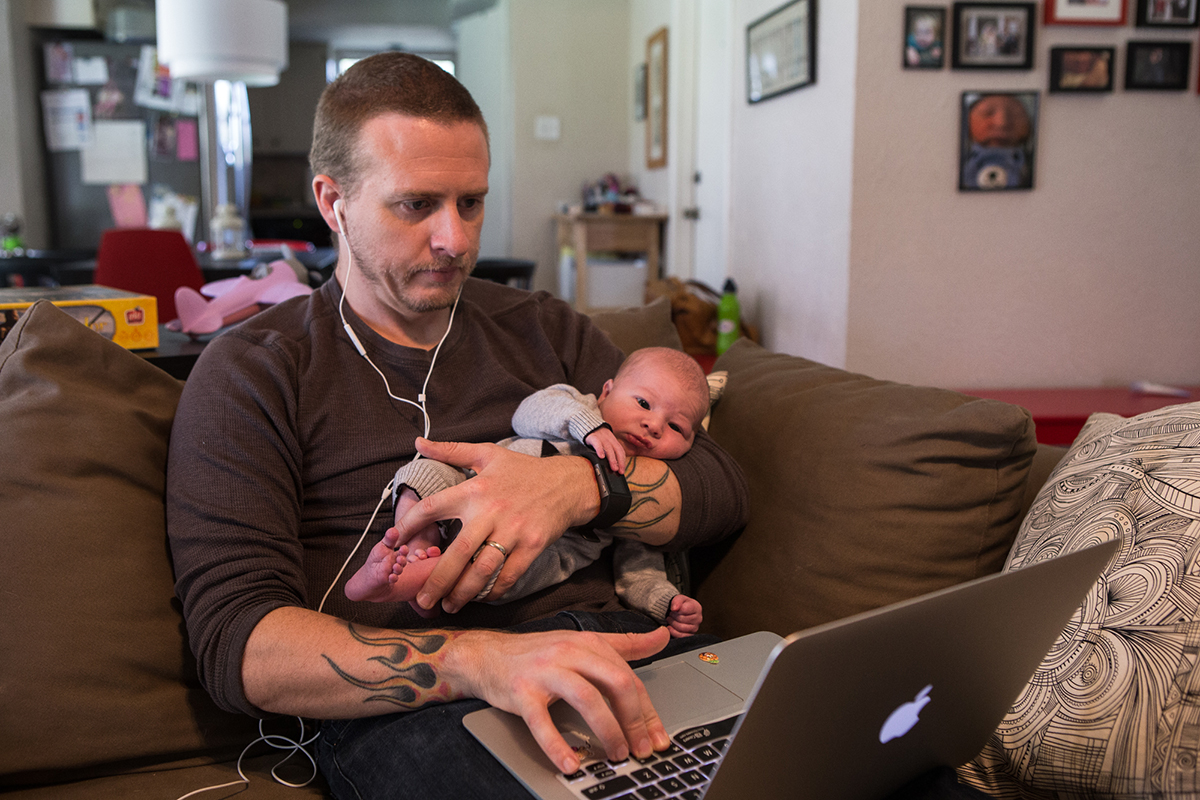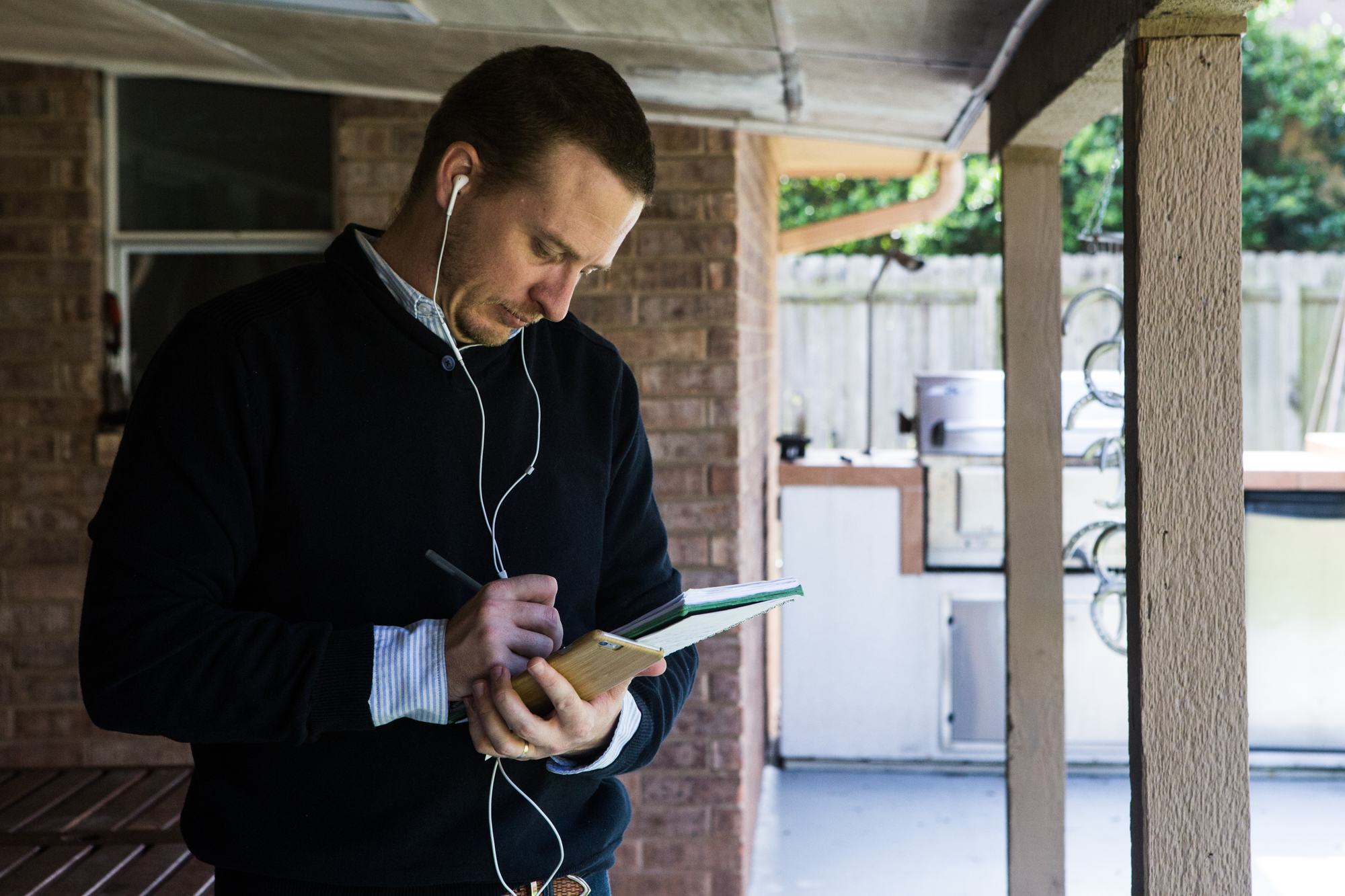Tech Firms Increasing Their Recruiting Efforts Among Veterans
By Dagney Pruner
Reporting Texas

Army veteran Eric Burleson holds his newborn son, Emerson, at his home in Austin. Burleson is working from home for an Austin tech company while on paternity leave. Dagney Pruner/Reporting Texas
For Reporting Texas
Eric Burleson knows that his road to career success wasn’t the norm. After leaving the armed forces, he had to fight to find a path to civilian life and a new career.
Without any transition programs available to him, the self-proclaimed nerd took a leap of faith and applied to business school. A couple of years later, he entered Austin’s booming technology industry. He knows many of his fellow service members were not as lucky.
Burleson, 34, spent six years in the U.S. Army’s Special Forces before moving to Austin to attend the entrepreneurship MBA program at the University of Texas at Austin’s McCombs School of Business. He is now the product manager of program services at Austin-based Invodo, which specializes in video curation for brands.
“Veterans should be aware of what sorts of things there are to do out there. They may not be easy, but there are effective ways to find meaningful employment after the military,” Burleson said. “Something that matters, not just that pays well.”
Veterans who have served since Sept. 11, 2001, have the highest unemployment rate of any veteran group, at 5.8 percent in 2015. That compares to an overall veteran jobless rate of 4.6 percent at that time and a national unemployment rate of 4.9 percent.
While veterans traditionally are recruited into more industrial and operational environments, more are exploring the tech entrepreneurial field. The industry satisfies veterans’ needs for challenges and a sense of purpose, while their work ethic and abilities are well suited for the technology industry – especially in Austin. That’s why tech companies are putting new emphasis on recruiting veterans.
“The heart and soul of the city of Austin is a true Texan. They are very supportive of the veteran community,” Burleson said. “That’s one of the parts of being a Texan: this fierce independence and friendly support for your neighbor — veterans in particular.”
Burleson found the tech world a perfect fit for a combat veteran: “There’s purpose and meaning to what you to do on a day-to-day basis. It’s good. You want to see the results of your actions.”
A number of grassroots initiatives have focused on recruiting recent veterans into the tech field because of their accountability, drive and dedication.
“How do we serve the people that in essence have taken care of America’s sons and daughters? How do we give them employment where they can take off?” said Sam Pandey, a member of the National Guard and director of entrepreneurship at VetsinTech, which helps veterans integrate into the technology industry in Texas.
San Francisco-based tech recruiting firm Betts Recruiting is the latest company to announce that it will join the effort to bridge the gap between military service and the private sector. Its initiative “Betts Vets” will alert technology and startup companies to veteran candidates.
Betts Recruiting’s Austin office will be a crucial point of sourcing talent. More than 1.6 million veterans live in Texas, according to the U.S. Department of Veteran Affairs — second only to California. In Killeen, home of the Fort Hood Army base, one in every three adults is a veteran, according to the U.S. Census Bureau.
“I think it’s the perfect world of two things colliding. The largest tech companies calling Austin their second home, and the Central Texas region is huge for veterans getting out of the military and saying: what do we do now?” said Chad Bonner, who served in the Army after graduating from the U.S. Military Academy, in West Point, N.Y. He now leads the Austin chapter of VetsinTech.
The Department of Defense is joining efforts to engage veterans and active members of the military in technology. Secretary of Defense Ash Carter announced in September that his department would choose Austin to open the third hub of its Defense Innovation Unit Experimental, also called DIUx.
“Given this city’s and this region’s deep commitment to innovation and also, I should say, this state’s deep connections to those who serve, we couldn’t have picked a better place,” Carter said at a news conference in Austin.
“Let me assure you — I not only want to keep Austin weird, I’m counting on it because the creative thinking that happens in places like Austin is part of what makes our country so innovative and our economy so vibrant and strong,” he said.

Veteran Eric Burleson takes a call for his technology job in the backyard of his home in Austin, Texas on November 10, 2016. Burleson is on paternity leave to take of his newborn son, Emerson. Dagney Pruner/Reporting Texas
Veterans often want the same thing after leaving the military: to be part of something bigger than themselves, to have purpose.
“When you no longer wear a uniform, a lot of what you thought about yourself has changed. Who are you, and where do you think of yourself in this broad-strokes world?” Bonner said of his transition from field artillery officer to civilian.
One thing veterans have going in their favor is their resilience — their ability, learned in combat, to adapt to different situations.
“We are a group that is told, ‘Take the hill, but I won’t tell you exactly how to get there,’ ” Bonner said. Technology companies value that trait, he said.
Veterans of special operations forces, such as Navy SEALs, Green Berets and Army Rangers, are a particularly good fit for the technology industry.
“We place a higher number of veteran in tech than any other sector,” said Joe Musselman, who served in the Naval Special Warfare Command and founded The Honor Foundation, which helps Navy SEALS and other U.S. Special Operations Forces transition to working in civilian life. The foundation has campuses in San Diego, California, and Virginia Beach, Virginia.
“We want to prove that hiring a special operations veteran will have a significant difference on the success of the business,” Musselman said. His organization has seen great success placing SEALS in startups and the technology community.
“The fray is where these veterans like to go, and there is no better fray or fight or scramble than to be in the startup environment,” he said.
Employers have a hard time finding candidates with the personality traits that veterans possess, said Carolyn Betts, chief executive officer of Betts Recruiting.
“These guys come out of the military and they have a lot of transferable skills, but it’s hard to apply them in the business setting,” she said. Betts hopes recruiting firms can help veterans transfer these skills.
The firm announced the launch of its initiative on Nov. 11, Veteran’s Day, noting that veterans “are highly disciplined, driven, and excel at both leading teams and working independently,” Betts said in a press release.
Pandey has seen an improvement in tech companies’ perception of veterans. “However, there is still this learning curve in what a soldier, sailor or officer brings out to the real world,” he said.
Burleson said making the transition is more than just getting recruited.
“A lot of that is about self awareness and decoupling yourself from the bad things and carrying with you the good things, and being able to market that properly to startups,” he said.